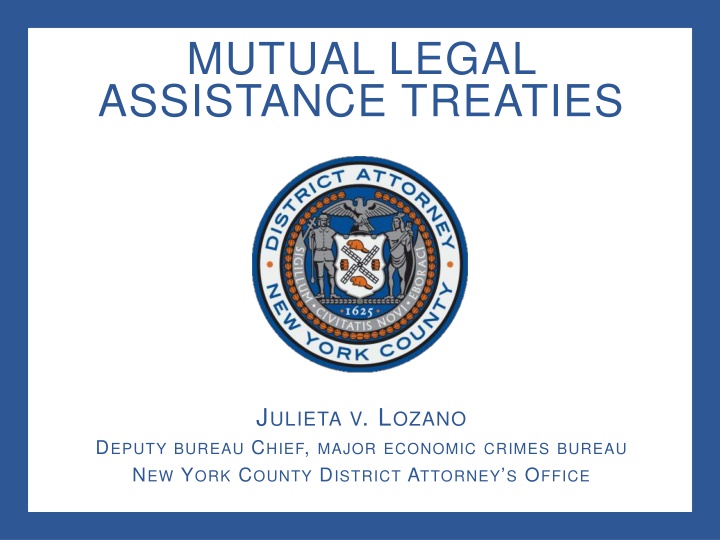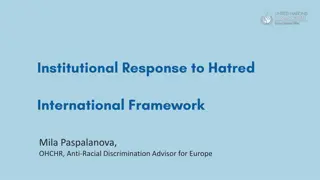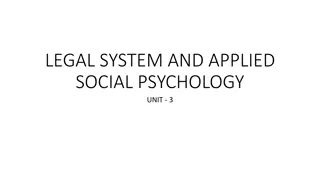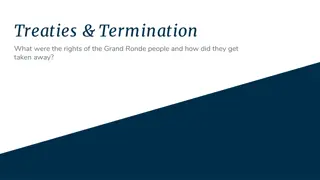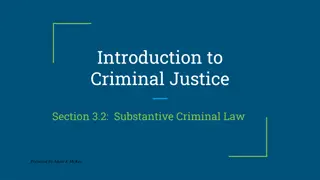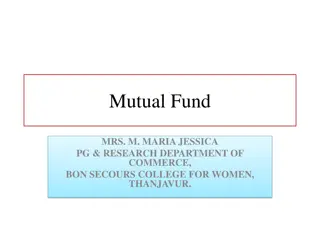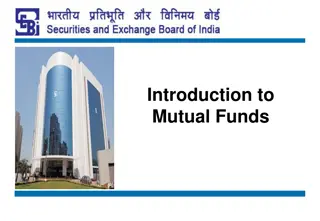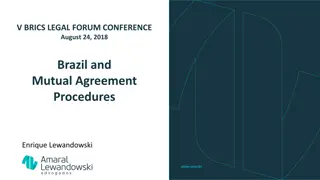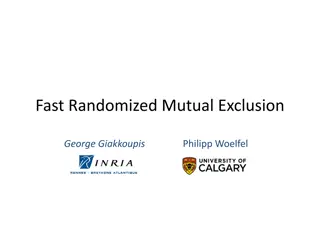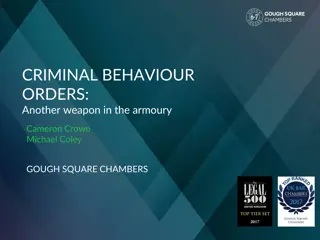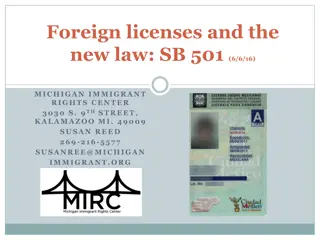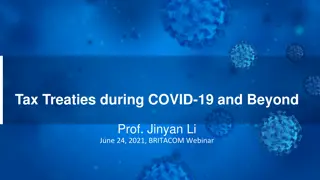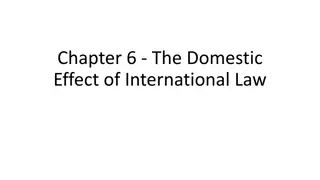Overview of Mutual Legal Assistance Treaties in Criminal Matters
Mutual Legal Assistance Treaties (MLATs) play a crucial role in facilitating international cooperation in criminal investigations and proceedings. They allow for the exchange of evidence, documents, and other forms of legal assistance between countries. MLATs come in various types, such as bilateral, multilateral/regional agreements, and subject-specific treaties. The functions and utilities of MLATs include obtaining evidence, serving legal documents, executing searches, and seizing assets. The UN Model MLAT provides a framework for extensive mutual assistance. Requesting and receiving assistance is facilitated through national central authorities responsible for processing and transmitting MLAT requests.
Download Presentation

Please find below an Image/Link to download the presentation.
The content on the website is provided AS IS for your information and personal use only. It may not be sold, licensed, or shared on other websites without obtaining consent from the author.If you encounter any issues during the download, it is possible that the publisher has removed the file from their server.
You are allowed to download the files provided on this website for personal or commercial use, subject to the condition that they are used lawfully. All files are the property of their respective owners.
The content on the website is provided AS IS for your information and personal use only. It may not be sold, licensed, or shared on other websites without obtaining consent from the author.
E N D
Presentation Transcript
MUTUAL LEGAL ASSISTANCE TREATIES JULIETA V. LOZANO DEPUTY BUREAU CHIEF, MAJOR ECONOMIC CRIMES BUREAU NEW YORK COUNTY DISTRICT ATTORNEY S OFFICE
OVERVIEW I. II. Uses & Functions of MLATs III. Requesting and Receiving Assistance IV. MLAT Variability V. Refusal of Assistance VI. MLAT Pros & Cons VII.Alternatives to the MLAT Process MLAT Typologies
INTRODUCTION Mutual Legal Assistance Treaty (MLAT) - Types Bilateral Country to Country U.S. alone is party to 55 bilateral MLATs Generally applicable to criminal investigations/proceedings Multilateral/Regional Agreement among groups of countries Similar to bilateral MLATs in subject matter E.g., Organization of American States (OAS) Inter-American Convention on Mutual Legal Assistance, legal assistance within the Economic Community of West Africa (ECOWAS) Subject-Specific Sponsored, drafted, and overseen by the United Nations Tailored to combat particular forms of crime E.g., UN Convention against Corruption (UNCAC), UN Convention against Transnational Organized Crime (UNTOC), International Convention for Suppression of the Financing of Terrorism
FUNCTIONS & UTILITIES Taking evidence or statements from persons Obtaining original/certified copies of documents and records for use in court proceedings Effecting service of process MLAT Executing searches and seizures Examining objects or sites relevant to an investigation Restraining or seizing foreign property or assets
UN MODEL MLAT What is the UN Model MLAT? Model Treaty on Mutual Assistance in Criminal Matters [T]he widest possible measure of mutual assistance in investigations or court proceedings in respect of offences which falls within the jurisdiction of the judicial authorities of the requesting State. UN Model MLAT Art. 1 1
REQUESTING AND RECEIVING ASSISTANCE NATIONAL CENTRAL AUTHORITY Solely Responsible for: Processing & transmitting domestic MLA requests to foreign jurisdictions Receiving & processing MLA requests from abroad
REQUESTING AND RECEIVING ASSISTANCE 2. Contact Central Authority and obtain applicable MLAT template 1. Identify Assistance Required Evidence Witnesses Records Assets and seizure 4. Submit MLAT request to national Central Authority for transmission to requested country s Central Authority 3. Draft Formal MLAT Request Contents/supporting documents vary immensely MLAT under which request is made controls
MLAT VARIABILITY While strict format and content requirements typically apply to MLATs, treaties may vary widely in certain areas: Process Evidence Specific procedures versus default to Requested State s procedures Degree to which Requested State interposes own laws and rules as barriers to assistance Dual criminality requirement Voluntary testimony versus compelled testimony Authentication/certification of documents versus presumption of validity Asset forfeiture provisions
REFUSAL OF ASSISTANCE MLATs include legitimate bases for refusing requests. Examples include: Non-conformity with MLAT requirements Inconsistency with the public interest or domestic law of the Requested State Failure to satisfy dual criminality requirement Offense related to a political character or serves political purposes Substantial grounds to suspect will result in discrimination Requested State cannot comply with requested procedures Double jeopardy protection
MLAT - PROS & CONS Predictability Increased predictability to responses MLA requests previously disfavored for their unpredictability and unreliability Wide scope of assistance Service of process, witness testimony, execution of searches and seizures Securing financial records, law enforcement documents, and digital evidence Simplification Modern-day MLATs contain streamlined request processes that improve accessibility
MLAT PROS AND CONS Time-consuming Response times vary widely Largely dependent on how well articulated the process is Varying record-keeping practices Jurisdictions differing record-keeping practices may hinder fulfillment of specific requests Treaty-specific barriers Privacy laws Privacy laws vary widely from country to country, often leading to difficulties procuring certain data E.g., The EU General Data Protection Regulation (GDPR) CONS
ALTERNATIVES TO MLATS Voluntary Assistance Independent, direct contact with witnesses/institutions Agreement for voluntary provision of evidence FIU to FIU Requests Request from one country s FIU to another country s FIU for suspicious activity reports Restrictions limited to investigatory/intelligence use only LE to LE Requests Informal requests made by one law enforcement agency to another law enforcement agency Generally for investigatory/intelligence use only Restrictions on use of evidence in court dependent on LE agency providing the information Letters Rogatory Formal request from one court to a foreign court for judicial assistance Often unreliable
THANK YOU JULIETAV. LOZANO DEPUTYBUREAU CHIEF, MAJORECONOMICCRIMESBUREAU NEW YORKCOUNTYDISTRICTATTORNEY SOFFICE
